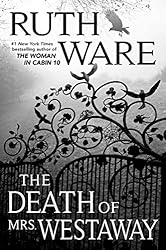Death of Mrs. Westaway (Ware)
| Article Index | Summary | Author Bio | Book Reviews | Discussion Questions | Full Version |
|---|
The Death of Mrs. Westaway
Ruth Ware, 2018
Gallery/Scout Press
384 pp.
ISBN-13: 9781501156212
Summary
On a day that begins like any other, Hal receives a mysterious letter bequeathing her a substantial inheritance. She realizes very quickly that the letter was sent to the wrong person—but also that the cold-reading skills she’s honed as a tarot card reader might help her claim the money.
Soon, Hal finds herself at the funeral of the deceased … where it dawns on her that there is something very, very wrong about this strange situation and the inheritance at the center of it.
Full of spellbinding menace and told in Ruth Ware’s signature suspenseful style, this is an unputdownable thriller from the Agatha Christie of our time. (From the publisher.)
Author Bio
• Birth—1977
• Raised—Lewes, Sussex, England, UK
• Education—B.A., Manchester University
• Currently—lives in London
Ruth Ware is the British author of mystery thrillers. She grew up in Sussex, on the south coast of England. After graduating from Manchester University she moved to Paris, before returning to the UK. She has worked as a waitress, a bookseller, a teacher of English as a foreign language, and a press officer. She now lives in London with her husband and two small children.
After her debut In a Dark, Dark Wood was published in 2015, Ware was asked by NPR's David Greene about mystery writers who had influenced her:
I read a huge amount of it as a kid. You know, Agatha Christie, Josephine Tey, Dorothy L. Sayers, Sherlock Holmes. And I didn't consciously channel that when I was writing, but when I finished and reread the book, I did suddenly realize how much this kind of structure owed to...Agatha Christie. And it wasn't consciously done, but...I would say I definitely owe a debt to Christie.
Indeed many have noticed Christie's influence in both of Ware's books, including her second, The Woman in Cabin 10, released in 2016. Ware's third novel, The Lying Game, came out in 2017, and her fourth, The Death of Mrs. Westaway in 2018. (Adapted from the publisher.)
Book Reviews
[A] tense, twisty modern gothic.… Evocative prose, artfully shaded characters, and a creepy, claustrophobic atmosphere keep the pages of this explosive family drama turning.
Publishers Weekly
Since blasting onto the scene with In a Dark, Dark Wood, Ware has come up with some pretty intriguing premises, and this sounds no different.
Library Journal
(Starred review.) [T]his is a very human mystery. The isolation of Trepassen House, its magpies, and its anachronistic housekeeper cultivate a dull sense of horror. Ware's novels continue to evoke comparison to Agatha Christie…. Expertly paced, expertly crafted.
Kirkus Reviews
Discussion Questions
We'll add publisher questions if and when they're available; in the meantime, please use our GENERIC MYSTERY QUESTIONS to start a discussion for THE DEATH OF MRS. WESTAWAY … then take off on your own:
GENERIC DISCUSSION QUESTIONS
Mystery / Crime / Suspense Thrillers
1. Talk about the characters, both good and bad. Describe their personalities and motivations. Are they fully developed and emotionally complex? Or are they flat, one-dimensional heroes and villains?
2. What do you know...and when do you know it? At what point in the book do you begin to piece together what happened?
3. Good crime writers embed hidden clues in plain sight, slipping them in casually, almost in passing. Did you pick them out, or were you...clueless? Once you've finished the book, go back to locate the clues hidden in plain sight. How skillful was the author in burying them?
4. Good crime writers also tease us with red-herrings—false clues—to purposely lead readers astray? Does your author try to throw you off track? If so, were you tripped up?
5. Talk about the twists & turns—those surprising plot developments that throw everything you think you've figured out into disarray.
- Do they enhance the story, add complexity, and build suspense?
- Are they plausible or implausible?
- Do they feel forced and gratuitous—inserted merely to extend the story?
6. Does the author ratchet up the suspense? Did you find yourself anxious—quickly turning pages to learn what happened? A what point does the suspense start to build? Where does it climax...then perhaps start rising again?
7. A good ending is essential in any mystery or crime thriller: it should ease up on tension, answer questions, and tidy up loose ends. Does the ending accomplish those goals?
- Is the conclusion probable or believable?
- Is it organic, growing out of clues previously laid out by the author (see Question 3)?
- Or does the ending come out of the blue, feeling forced or tacked-on?
- Perhaps it's too predictable.
- Can you envision a different or better ending?
8. Are there certain passages in the book—ideas, descriptions, or dialogue—that you found interesting or revealing...or that somehow struck you? What lines, if any, made you stop and think?
9. Overall, does the book satisfy? Does it live up to the standards of a good crime story or suspense thriller? Why or why not?
(Generic Mystery Questions by LitLovers. Please feel free to use them, online or off, with attribution. Thanks.)
Site by BOOM
![]()
LitLovers © 2024


